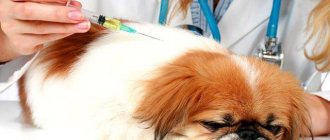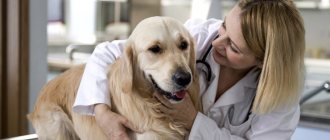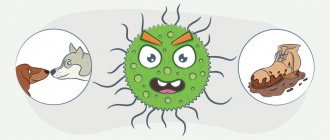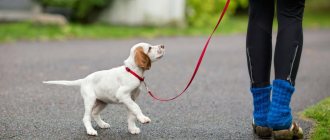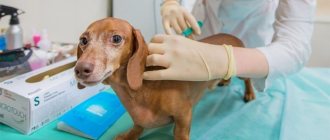Although immunization of dogs against rabies is accompanied by a number of side symptoms and complications, it is not recommended to refuse it. This is due to the fact that rabies is incurable, and this disease is also transmitted to other animals and people and leads to death. This is confirmed by the fact that vaccination provides preventive measures, and control is carried out at the state level. It is possible to minimize the consequences.
To do this, you need to properly prepare your pet for vaccination, study information about all the nuances and possible symptoms, and most importantly, carry out the procedure in a trusted veterinary clinic and entrust the work to a professional.
Preparing your dog for rabies vaccination
Rabies vaccination is one way to protect your pet from deadly infections. Domestic and foreign drugs are used for vaccination, and complex vaccinations containing a weakened strain of the virus are also given.
Dogs need to be vaccinated in a number of cases:
- Breeding is planned.
- To take a pet to another country, abroad.
- The animal lives in unfavorable regions where this disease occurs.
- The dog takes part in exhibitions, competitions, competitions.
Vaccination of hunting dogs deserves attention, because they often spend a long time in forests where there are sick wild animals and they can bite the dog.
On average, a month after vaccination, the animal acquires strong immunity to this type of disease. The duration of such protection varies from 1 to 3 years. It all depends on the drug used. Puppies are vaccinated at four months of age, at the time when the baby teeth are replaced. Adult dogs are given the injection annually. The vaccination schedule is prescribed by the veterinarian.
Before the procedure, the doctor examines the animal and determines its general condition. If there are no contraindications, the veterinarian administers the drug. This information is recorded in the veterinary passport, which is confirmed by the date and stamp of the doctor. After the procedure, protect the dog from contact with other animals and quarantine for 14 days. During the week, vigorous physical activity and water procedures are prohibited.
Advice! 3-4 months before vaccination, it is recommended to worm the dog and treat the fur for possible parasites.
Which vaccine is best to vaccinate a dog?
Today there are many polyvaccines, both imported and domestically produced. All vaccines have undergone clinical trials and are not particularly different from each other. The use of any of them promotes the development of immunity. But if you are going to travel abroad with your dog, then the requirements of, for example, the European Union for the non-commercial movement of pets limit the list of vaccines used.
If you plan to travel around the world with your dog, then imported polyvalent vaccines such as Nobivak, Eurican, Duramun are recommended.
You can read in more detail about preparing your four-legged dog for vaccination and about the vaccination schedule from birth.
So, you have properly prepared the animal for the procedure and vaccinated it. I have already written that after vaccination the animal’s immunity is very weakened, so the risk of contracting a viral disease is very high. Therefore, after vaccination, quarantine should be strictly observed.
How to choose the right vaccine
Questions about choosing a vaccine for vaccinating dogs are the most common. Veterinarians say that a lot depends on the choice of drug. Included with any vaccine are regulatory documents with all the necessary information, the implementation of which is mandatory. On the territory of Russia there is a list of drugs that have passed the registration process and are approved for sale and use. You can purchase drugs from domestic and foreign manufacturers.
Attention! Before giving your pet a rabies injection, it is recommended to clarify the instructions for the following vaccinations and the quarantine period.
Precautions for vaccination
To keep your puppy as safe as possible, schedule his vaccinations on days when you can be home with him. Before your visit, try to understand how much time your puppy sleeps each day so you can quickly determine if your puppy is lethargic after vaccination.
If your puppy or dog has ever had a reaction to a vaccine, your veterinarian may want to run a titer to determine your dog's immunity and determine if future doses of this vaccine are needed. In some cases, your veterinarian may pre-treat your dog with allergy medication before administering the vaccine, if necessary.
Vaccines provide your puppy valuable protection against life-threatening diseases. While vaccines do carry the risk of an allergic reaction, the risk is minimal and most pets will never have a problem.
Author of the article: Vanessa Salvia . Vanessa lives on a garden and sheep farm in Western Oregon, which she shares with cats, dogs, horses, sheep, and a variety of wild animals.
Possible complications after vaccination in dogs
Rabies vaccination is mandatory for dogs. And not because such actions are required by law, but in order for the pet to remain healthy, its immunity is under reliable protection. In some animals this process occurs without pain and no complications are observed. Other pets go through this extremely difficult. There are frequent cases of complications after vaccination. There are several most common consequences. And the dog owner needs to know about them.
Lethargy
Many pet owners note that the dog becomes ill after vaccination and is constantly lethargic. It is important to understand that such a reaction is completely normal and there is no need to panic. For several days after vaccination, the dog is lethargic and apathetic. With age, the reaction to the vaccine becomes weaker and less significant.
If after vaccination your pet appears lethargic, but the body temperature is not elevated and there are no other symptoms, then there is definitely no cause for concern. It is recommended to observe the dog for some time. If no improvement appears after a few days, you should seek help from a veterinarian.
Attention! Most often, these side effects occur in puppies.
Lameness
After vaccination, a dog often begins to limp. This is due to the fact that the injection site hurts for a short time. There is no need to be afraid of such a reaction. After 3-4 days, the pain will completely disappear, the lameness will disappear, as if it never happened. The little puppies whine a little in pain. If there are no other symptoms, then do not panic. After two days, the pain goes away and the puppy begins to behave as before. Adult dogs behave differently because they are aware of the cause of the pain.
Puppies exhibit this reaction due to fear, since they do not understand the causes of pain. If after 4 days the animal does not feel better and complications appear, then this is a good reason to contact a veterinary clinic.
Lost appetite
Dog owners say that the dog does not eat, and if it does eat, it is very bad, with reluctance. In such a situation, a certain period of time is also required, since many dogs refuse to eat after vaccination. On the first day of vaccination, the animal experiences stress due to the trip, injection, veterinary clinic, which leads to refusal to eat.
This phenomenon is considered normal. However, if refusal to eat continues for more than half a day, then it is better to consult a doctor and tell him about your worries about this. The veterinarian may need to conduct an examination or take tests. If you lose your appetite and other symptoms appear, you should immediately visit the clinic.
Nausea
Another common side effect is that animals begin to feel sick and vomit. This is considered normal when a pet vomits only once after vaccination. If after the injection your dog constantly feels sick and the vomiting does not stop, you should immediately contact a veterinarian.
It is not recommended to delay, because otherwise negative consequences cannot be avoided. The sooner your pet receives qualified help, the faster it will be cured.
Attention! It is not the best option to self-medicate dogs using information on various Internet resources.
The vaccination site turned red and a lump appeared
The place where the animal was vaccinated turns red or swells, sometimes small red bumps appear. This reaction is normal and you shouldn’t be afraid of it. A similar reaction occurs in many pets after rabies vaccination. However, if more than two weeks have passed and the redness and swelling have not gone away, consult a doctor. An increase in the size of the lump and an increase in body temperature indicates an allergic reaction to one of the components in the vaccine or a more serious illness.
The temperature is rising
A body temperature of 39.5 degrees is considered normal after vaccination. If the animal feels bad and the temperature is at this level, then there is no need to worry. This temperature persists for three days, which is considered normal. If it lasts longer, this is a reason to see a doctor.
Complications that do not require specialist help
Unfortunately, even if you properly prepare for vaccination and choose a high-quality injection, you will often not be able to avoid side effects. Panic is not the best option. It is best to provide first aid to your pet or immediately go to a veterinary clinic for examination.
There are complications that are normal and acceptable and veterinarian intervention is not required. These include:
- Lethargy that lasts for the first 24 hours.
- Refusal to eat for 10–12 hours.
- Increase in temperature up to 3 days to 39.5 degrees.
- A disorder of the digestive system that causes the animal to have diarrhea and vomiting.
- Redness and thickening appear at the injection site, but the dog does not experience any discomfort.
If a lump appears at the vaccination site and after 3 days it has not gone away, but has become hot and painful, you should consult a veterinarian.
Complications requiring medical intervention
There are cases when unscrupulous veterinarians carry out procedures without using antiseptics or use a low-quality vaccine. In this case, in addition to side effects, the dog develops clinical complications.


